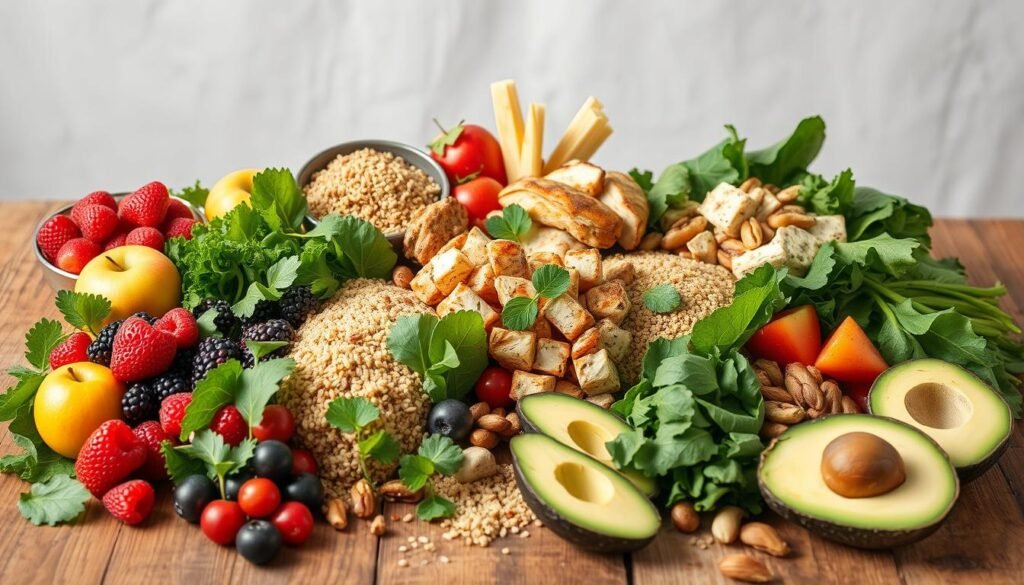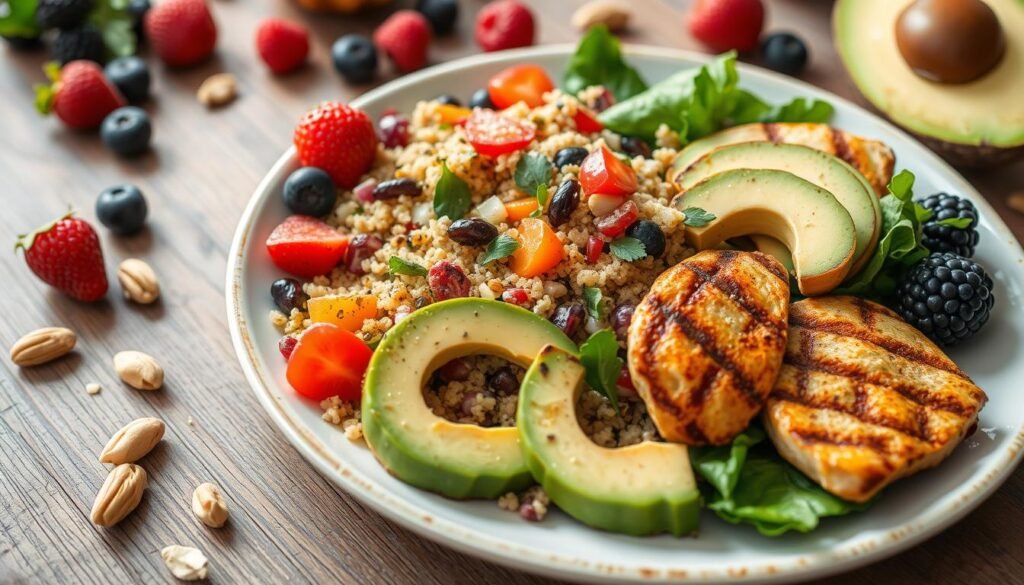About 1 in 10 women of reproductive age deal with Polycystic Ovary Syndrome (PCOS). This health issue is often tied to insulin resistance. Choosing a Low Glycemic Index Diet can greatly help those struggling with this hormonal imbalance. It helps manage PCOS symptoms and prevents conditions like diabetes.
The diet focuses on foods that release sugar slowly. This action keeps blood sugar levels even. It supports good health overall.
Women with PCOS may gain weight and face metabolic issues. So, it’s very important to live healthily. Eating foods from the low glycemic index can better insulin sensitivity and assist in weight loss. For more on this diet’s advantages, see helpful info on diabetes management for women with PCOS. This diet change is a beacon of hope for many seeking to improve their health and relieve PCOS symptoms.
Key Takeaways
- The Low Glycemic Index Diet can significantly help manage symptoms related to PCOS.
- Stabilizing blood sugar is essential for women with PCOS to improve overall health.
- Incorporating low glycemic index foods can promote weight loss and reduce insulin resistance.
- Healthy living practices are necessary for effective PCOS management.
- Community support and lifestyle adjustments complement dietary changes in managing PCOS.
- Explore additional strategies for a holistic approach to managing PCOS, including exercise and stress management.
- Learn more about the role of carbohydrates in health by following recommended resources.
Understanding PCOS and Its Impact on Women
Polycystic Ovary Syndrome, or PCOS, is a condition many women face. It affects those in their reproductive years. Grasping what PCOS means is crucial because it’s about more than just hormone issues.
Women with PCOS deal with symptoms like irregular periods, acne, and too much hair growth. These signs are troubling and affect their lives deeply.
The impact of PCOS on women is huge. Hormone changes can cause infertility, diabetes, and heart issues. Knowing this, women can start to manage their health better.
PCOS leads to both physical and emotional challenges. Because of this, finding the right treatment is key. It helps in making life better for those affected.
Understanding PCOS also includes knowing how food affects it. Eating foods with a Low Glycemic Index can help. This diet improves insulin resistance and overall health.
What is the Low Glycemic Index Diet?
The Low Glycemic Index Diet is about choosing foods that have a low glycemic index. This helps keep blood sugar stable. It emphasizes whole foods over refined sugars. Adding these foods to your meals brings health benefits. This is true for women with PCOS.
Key Principles of Low Glycemic Index Foods
The diet is based on a few important ideas:
- Eat whole grains like brown rice and quinoa.
- Include legumes such as lentils and chickpeas.
- Choose fruits and vegetables with low glycemic values.
- Stay away from refined carbs and sugary snacks.
Benefits of Adopting a Low Glycemic Index Diet
The benefits of this diet are significant for health. Here are some key perks:
- Improved blood sugar control, crucial for insulin sensitivity.
- Reduced risk of diabetes, important for women at risk of insulin resistance.
- Promoting weight loss by keeping energy stable and cravings at bay.
- Enhancing hormonal balance, helpful for managing PCOS symptoms.

How Does the Low Glycemic Index Diet Help Manage PCOS?
The low glycemic index diet is key in managing polycystic ovary syndrome (PCOS). It favors foods that help control blood sugar levels smoothly. This is important because it balances hormones and supports weight loss in PCOS patients. Knowing how this diet works shows why it’s a game changer for many women.
Blood Sugar Control and Hormonal Balance
For women with PCOS, keeping blood sugar levels stable is crucial. Foods high in glycemic index can quickly raise blood sugar, making insulin resistance worse. But, the low glycemic index diet avoids this problem. It encourages eating foods that slowly change blood sugar levels. This helps fix hormone imbalances, easing PCOS symptoms.
Weight Loss Benefits for Women with PCOS
Losing weight with PCOS can be tough, yet the low glycemic index diet helps a lot. This diet includes foods rich in fiber and nutrients. This makes you feel full longer, helping cut down on calories. Many women find losing weight easier with this diet. It aligns with healthy eating goals.
A low glycemic index diet also lowers risks like obesity, heart disease, and diabetes. It boosts overall wellness. For more info, check out this study on its benefits.

Low Glycemic Index Diet: A Game-Changer for Women with PCOS
The Low Glycemic Index Diet is changing the game for women with PCOS. It’s known for significantly improving metabolic health and life quality. By choosing foods with a low glycemic index, women can keep their blood sugar steady. This is key for managing PCOS symptoms.
Those who have tried this diet report better hormone balance and less cravings. They also note a drop in weight. Experts agree that eating right is crucial for dealing with PCOS. Thus, this diet is often part of a broader treatment plan.

Here is a glimpse at how the Low Glycemic Index Diet has helped women:
| Reported Improvement | Percentage of Women Reported |
|---|---|
| Weight Loss | 75% |
| Reduced Acne | 60% |
| Improved Menstrual Regularity | 70% |
| Lowered Insulin Resistance | 80% |
| Enhanced Mood Stability | 65% |
The data shows the Low Glycemic Index Diet’s success in helping women with PCOS. It creates a nutrition plan that supports their health. This allows them to take charge of their well-being again.
Incorporating Fiber-Rich Foods into the Diet
Adding fiber-rich foods to a low glycemic index diet is key for health. Especially for those with PCOS or diabetes. Fiber is vital in our diets since it supports various body functions and keeps blood sugar stable.
Examples of Fiber-Rich Foods
- Legumes (such as beans, lentils, and chickpeas)
- Whole grains (like quinoa, brown rice, and oats)
- Fruits (particularly apples, berries, and oranges)
- Vegetables (such as broccoli, carrots, and leafy greens)
How Fiber Aids in Diabetes Management
Fiber is vital for managing diabetes. It slows down how fast the body absorbs carbs, avoiding blood sugar spikes. This makes fiber-rich foods great for people wanting to control their blood sugar for better health. For women with PCOS, it helps in keeping a healthy weight, improves digestion, and makes you feel full longer.
Understanding Carbohydrate Counting on a Low Glycemic Index Diet
Counting carbs is key for managing a diet for PCOS. It helps track carbs to control blood sugar better. Learning to count carbs and control portions helps women with PCOS choose their food wisely.
Basics of Carbohydrate Counting
Counting carbs means keeping track of carbs eaten during the day. It helps you know the carbs in foods, like sugars and starches. Women can use food diaries or apps to track their meals. This knowledge lets them pick healthier options easily.
Portion Control Strategies
Knowing the right amount to eat is crucial with carb counting. Identifying correct serving sizes helps avoid overeating and keeps meals balanced. Using tools like measuring cups, a food scale, or visual aids helps with portion control.
Women can also try:
- Dividing plates into sections for different food groups.
- Using smaller plates to make plates look fuller.
- Aiming for a balanced plate with lean proteins, vegetables, and complex carbs.
Healthy Eating Habits for Women with PCOS
For women with Polycystic Ovary Syndrome (PCOS), eating right is key. Planning meals helps make preparing healthy dishes simpler. Eating whole foods is important for managing symptoms and feeling good.
Meal Planning and Preparation Tips
To plan well, choose good ingredients and prep them early. Eating foods with a low glycemic index keeps your blood sugar stable. Add fresh veggies, lean meats, and good fats for tasty, nutrient-rich meals. Here’s what you can do:
- Plan your weekly meals with different colors and textures.
- Cook in batches on weekends to save time during the week.
- Stock up on healthy snacks like nuts, seeds, and veggies.
Creating Balanced Meals with Complex Carbohydrates
Balanced meals should include complex carbs for steady energy. Good sources are whole grains, legumes, and starchy veggies. For women with PCOS, consider eating:
- Quinoa and brown rice as good bases
- Beans and lentils for extra protein
- Sweet potatoes for vitamins and minerals
These foods help keep blood sugar stable and control cravings. For more tips on eating right, check out this article. Regular meal planning is a big step towards healthier living with PCOS.
The Role of Whole Grains in a Low Glycemic Index Diet
Eating whole grains is key for women with Polycystic Ovary Syndrome (PCOS). Foods like quinoa, farro, and brown rice are full of nutrients and fiber. This helps with digestion and keeps blood sugar levels steady. Whole grains also ensure a steady flow of energy. This is great for women dealing with PCOS symptoms.
Studies show that whole grains can lower fasting glucose in the blood. This is good news for those focusing on glycemic control. A detailed study confirmed that whole grains reduce fasting glucose, especially in people with normal blood sugar levels. So, including whole grains in your diet can boost your metabolic health and ease PCOS symptoms.
Including whole grains in your diet is beneficial for managing blood sugar and promoting healthy eating habits. They allow for consistent energy all day and help women work on their health goals. To understand how whole grains affect PCOS, look at the resources available here. Adding whole grains to your meals is a wise choice for long-term health.